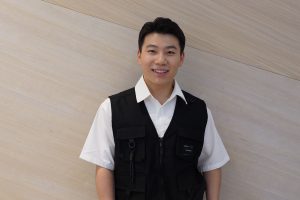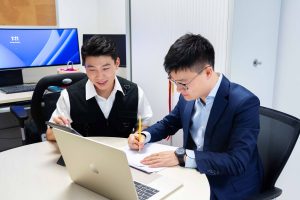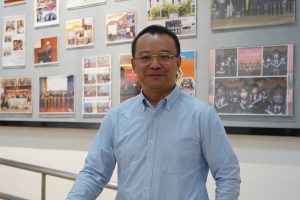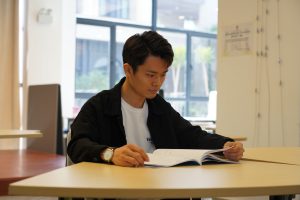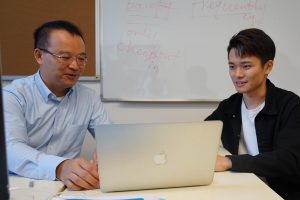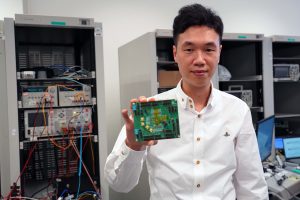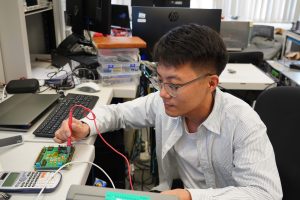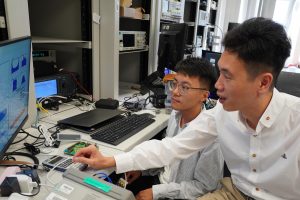In the classrooms, study halls, and laboratories of the University of Macau (UM), faculty and students are constantly engaged in research, exploring cutting-edge scientific questions. Their research work tests not only their knowledge and practical skills, but also their willpower. These individuals share what motivates their devotion to research at UM, and the triumphs and challenges of their research journeys.
Overcoming multiple challenges
Before achieving high academic recognition, every research paper must undergo numerous rounds of rigorous peer review. During this process, faculty and students must overcome various challenges and address every comment by the reviewers to ensure that their work meets the stringent criteria of the world’s top journals.
For Wen Bo, assistant dean of the Faculty of Social Sciences and associate professor in the Department of Government and Administration at UM, submitting his team’s paper to Public Administration Review for publication was no different from enduring a long march that tested both his intellect and patience. In the study, Prof Wen boldly integrated genetics with the field of public administration, creating an unprecedented research paradigm. Faced with rigorous scrutiny and repeated enquiries from reviewers, Prof Wen and his team spent up to a year and a half in continuous communication with the journal’s editor-in-chief, revising the paper based on feedback from peer reviews. Just when the team thought everything was progressing smoothly, updates from the journal stopped entirely for two months. ‘We were on tenterhooks the entire time,’ Prof Wen recalls.
Later, Prof Wen learned that the editor-in-chief, out of caution, had invited an additional biological expert to review their study. This unexpected development put enormous pressure on the team. They meticulously analysed the reviewers’ comments and did their utmost to revise the paper accordingly. Ultimately, their paper was published in the prestigious international journal Public Administration Review just as they had hoped, and it was selected as the best article of 2023 by experts in the field of public administration. Moreover, Prof Wen’s research team was awarded the William E. Mosher and Frederick C. Mosher Award by the American Society for Public Administration, making them become the first Asian (Chinese) scholars to receive this honour. These achievements demonstrate that Prof Wen’s academic expertise is recognised globally in the public administration community.
Despite these honours, Prof Wen has not become complacent. Instead, he remains dedicated to his academic pursuits. He says, ‘As a scholar, I challenge myself every day to develop or refine core theories in the field of public administration. I also strive to translate groundbreaking academic theories into innovative government practices to protect the well-being of citizens.’
Like a butcher dismembering an ox
The first step to producing high-quality research is to establish a solid research foundation through mastering academic knowledge.
After completing his master’s studies at University College London, UK, Ma Zhiyou joined UM to further his education. He is now a first-year doctoral student under Prof Wen Bo, who shares his maxim: ‘To grasp the flow, one must trace it back to its source; to reach great heights, one must first secure the foundation.’ Guided by this maxim, Ma immerses himself in academic literature every day, exploring the essence of various classic studies. He says, ‘Prof Wen has only set out two requirements for me at this stage: first, to carefully observe bureaucratic realities and identify the actual problems; second, to read classic works in public administration and learn from their research approaches and writing styles.’
Therefore, in addition to attending classes and observing details in everyday life, Ma devotes most of his time to reading classics in the library. He makes consistent efforts to digest and analyse each paragraph of the academic papers he reads, and to understand the paradigms and structures of previous studies.
On this academic journey, Prof Wen and Ma work closely together, engaging in daily brainstorming sessions in the office. Although Ma often studies until late night, he believes that this process will greatly facilitate his future research endeavours. He explains, ‘This learning process is like a butcher dismembering an ox. By meticulously dissecting, analysing, digesting, and reassembling articles from top journals, I not only gain a thorough understanding of the discipline’s concepts, but also gradually acquire and master the fundamental skills of research and the techniques needed to present arguments effectively.’
‘Every journey of a thousand miles begins with a single step,’ remarks Prof Wen as he reflects on his time studying at the University of Southern California, US. ‘My supervisor placed a strong emphasis on consolidating students’ theoretical and methodological knowledge. Only when students master a broad range of research methods and cutting-edge theoretical perspectives can they conduct their research effectively and efficiently in the future.’
Full commitment is key
When conducting qualitative research in the humanities and social sciences, a common challenge is recruiting enough suitable interviewees to respond to survey questions. This difficulty increases as the research questions become more original and the scope of the study expands, particularly in nationwide studies where sampling becomes increasingly complex.
‘As long as the team works together, it is still possible,’ says Yu Shulin, associate professor in the Faculty of Education, when sharing his belief about conducting nationwide research. A scholar dedicated to advancing research on foreign language teaching and second language writing, Prof Yu has noticed that an increasing number of students have been engaging in ‘informal writing’¬¬─for example, journal-style posts on Facebook and food reviews on Xiaohongshu─in recent years. ‘How does this kind of writing enhance students’ English writing skills? There has not been any discussion on this topic in academia before, so I see the necessity to research it,’ he explains.
Once he decided to start the study, Prof Yu felt that he should be fully committed to it. He decided to take on the greater challenge of conducting nationwide purposive sampling, so that his research would be distinctive and the results would represent diverse groups. ‘We collaborated with faculty and students in Beijing, Shanghai, Shandong, and other places to recruit participants through a snowball sampling method. The process was time-consuming, and some students who had volunteered for interviews did not meet the research criteria. In addition, since the study was conducted during the pandemic, universities in the mainland restricted access to outsiders, making it more difficult to collect data.’
However, after several years of unremitting efforts, the research was published in the Journal of Second Language Writing. Published by Elsevier, this journal is ranked second in impact factor among 296 journals in the fields of applied linguistics and language education. In addition, Prof Yu and his team’s paper received the 2023 Best Paper Award from the journal.
Prof Yu says, ‘Although this research process was full of challenges, it was these challenges that allowed us to develop more convincing arguments and conclusions. Our findings have advanced the field of English teaching, which was also our original intention when we started this study.’
Similar to learning swordsmanship
Another critical aspect of research is choosing the appropriate research method. For novice researchers, training in research methods is essential.
Liang Chenggang, who completed his master’s degree at the University of Edinburgh, UK, is a doctoral student in the Faculty of Education. He compares research methods to swordsmanship in martial arts. While there are various styles of swordsmanship, Liang had only mastered the ‘qualitative’ style during his studies in the UK and lacked knowledge of the ‘quantitative’ style. Since joining UM, he has taken a course on research methods and started conducting research under Prof Yu Shulin and Prof Zhou Nan. As a result, he has learned qualitative, quantitative, and mixed research methods, and become familiar with the application of each method through practical research experience.
Everything is difficult in the beginning. Liang recalls that when he was first introduced to unfamiliar quantitative research methods, he was at a complete loss. ‘Fortunately, under the guidance of Prof Yu and Prof Zhou, I gradually grasped the principles of quantitative research methods and learned how to apply them. I began to understand how to choose appropriate research methods to explore my research questions, and I became skilful at using these methods.’
Throughout three years of training, Liang has participated in a total of 12 faculty research projects and has published papers in academic journals. Confident in his abilities, Liang’s two supervisors now also assign him to guide undergraduate students in their research. Liang shares, ‘Doing research has become one of my hobbies. I don’t see it as something difficult. Rather, the more I do it, the more confident I become.’
Only one feasible idea out of a hundred
In the rapidly evolving field of chip technology, continuous innovation is essential if one wants to stay at the forefront of development. This is also the shared goal of the members of the Institute of Microelectronics (IME) at UM.
So, how do researchers achieve innovative breakthroughs based on existing chip technologies? Chan Chi Hang, associate professor in IME, explains that it is important to approach problems from different perspectives and challenge established thinking. One way to do this is by altering the use of materials. Even when using a chip with the same function, innovative exploration can occur by leveraging the different characteristics of its circuit components. Prof Chan stresses, ‘As much as we strive for innovation, we need to ensure that the core of our research remains aligned with our original objectives and meets the needs of users. Achieving this requires the accumulation of time and experience.’
The scientific and technological innovation by Prof Chen and his team─a data conversion chip widely used for medical imaging and the Internet of Things─was officially unveiled at the Macau Industrial Products Show last month. The team is now focused on translating this innovation into a commercially viable product for the Greater Bay Area. Prof Chan says candidly that the development of every chip comes with significant challenges. ‘Faculty and students may come up with a hundred innovative methods, but often only one is feasible. Sometimes, during the implementation, we may find that even the one feasible idea can ultimately fail.’
However, Prof Chan emphasises that proving the infeasibility of an idea is still a contribution to knowledge. He says, ‘Unlike businesses, universities are a place where mistakes are allowed, and our first priority is to nurture people.’
After graduating from the University of Washington, US, in 2008, Prof Chan furthered his studies at UM under the supervision of Prof Rui Martins and other pioneers in chip technology in Macao. He participated in and witnessed the realisation of the university’s vision for chip innovation as it progressed from 0 to 1. He emphasises that the significance of research lies not only in the exploration of knowledge, but also in honouring the legacy of predecessors. For Prof Chan, it means advancing the development of the UM state key laboratory in microelectronics. ‘Our predecessors planted the seeds for us. As the younger generation, we should capitalise on the strengths of chip research in Macao, carry them forward, and strive to advance from 1 to 100.
A race against the clock
As night falls, the scientific research base located in the northern zone of the UM campus is still brightly lit. Faculty and students can be seen diligently working and meeting deadlines in the research laboratories.
Cao Yuefeng, a doctoral student in IME, joined UM after completing his master’s studies at Fudan University and working for two years as a technician at HiSilicon, a subsidiary of Huawei. He recalls the excitement he felt when he shared with his supervisor Prof Chan Chi Hang that their team’s second research paper had also been accepted by the International Solid-State Circuits Conference (ISSCC), the largest and most prestigious academic conference on solid-state circuits in the world. Even now, Cao cannot contain his thrill at the recognition their research findings at UM have received from ISSCC. This year, a total of 14 papers by UM scholars were accepted by ISSCC, placing the university among the top contributors alongside South Korea’s Samsung and the Korea Advanced Institute of Science and Technology in terms of the number of papers accepted.
Those working alongside Cao at IME include graduates from top international universities such as Tsinghua University and Peking University. Sharing the same passion for chip technology, they joined UM to turn their vision into reality. Despite the diminutive size of chips—smaller than a fingernail, the research and development process is immensely challenging, with efficiency being a critical aspect of chip development.
From circuit design to chip production, testing, adjustments, and finally paper writing, it is very important to ensure that everything stays on schedule. ‘Every second counts in our research and development. If we miss our timeline, our results might be preempted by others, rendering all our previous hard work in vain,’ Cao shares.
Cao recalls a challenging experience when the production of a chip he designed was delayed by the manufacturer for two months, which subsequently reduced the available testing time from two months to just two weeks. This delay forced him to fly to Shanghai to personally oversee the chip packaging and circuit board soldering once production was complete. He then carried the chips and circuit boards back to Macao the same night to ensure immediate testing at UM. ‘In those two weeks, I slept no more than four hours a day and worked tirelessly to meet the schedule,’ Cao shares. ‘Despite the challenges, all the hard work was worthwhile when I received the good news from ISSCC.’
Every cloud has a silver lining
During the research process, it is inevitable to encounter setbacks and difficulties. While the journey can be challenging and sometimes painful, discovering the correct path and reaching your goals can turn those hardships into joy. As the saying goes, every cloud has a silver lining.
In these interviews, all three doctoral supervisors note that students who are committed to their research not only develop stronger academic thinking but are also more likely to have more opportunities. In addition, a strong and healthy relationship often forms between supervisors and students during the process, which is an added benefit of engaging in research.
Text: Kelvin U, Trainee UM Reporter Loi Sze Ying, Chen Xinjie & Liu Aobing
English translation: Bess Che
Photos: Editorial Board
Source: My UM Issue 138

